Photographs: Jitendra Prakash/Reuters Devjyot Ghoshal in New Delhi
The last year has seen a staggering drop in the Indian public's confidence in the economy, transforming India into the most pessimistic among some of the world's major economies, including Brazil, China, the European Union and the United States, says the Pew Global Attitudes Project India Report.
The latter is the largest fall among the 17 nations with comparable data, according to the report.
Forty-nine per cent of Indians polled for the survey are satisfied with the current state of the economy, a seven percentage point drop from last year, while only 45 per cent of respondents are optimistic of the economy improving over the coming four quarters, 15 percentage points lower than the previous year's poll.
. . .
Why optimism about Indian economy is waning
Image: An Indian national flag is pictured in a street in Dharavi, one of Asia's largest slums, in Mumbai.Photographs: Danish Siddiqui/Reuters
"A year ago, Indians' economic mood trailed that in China, bested that in Europe and the United States, and was comparable to that in Brazil.
Today, Indians' evaluation of their current national economic situation trails that in China by 34 percentage points and Brazil by 16 points," the report said, "And, Indian optimism about the next year lags that in Brazil by 39 and China by 38 points."
The reason why much of the previous optimism has evaporated is reflected in what Indians perceive to be their biggest problems.
Eight in 10, or 80 per cent, of those polled said unemployment, followed by rising prices (79 per cent), were the most compelling challenges the country faces at the moment, underscoring the latent worry about an under-performing economy and spiralling prices.
. . .
Why optimism about Indian economy is waning
Image: A worker dismantles a worn-out rubber tyre for recycling at a workshop in Srinagar.Photographs: Danish Ismail/Reuters
The growing gap between the rich and the poor (72 per cent) and crime (71 per cent) were the other two major worries, respondents said, trailed by corrupt officials (70 per cent) and corrupt business people (65 per cent), likely candidates given the spate of scandals that have rocked the incumbent United Progressive Alliance-2 government through its current term.
Yet, this was before the ongoing alleged coal block allocation scam emerged, since the Washington-based Pew Center conducted 4,018 face-to-face interviews in the country between March 19 and April 19, representing 86 per cent of the adult population of India's 13 most populous states for the report.
. . .
Why optimism about Indian economy is waning
Image: Labourers transport sugarcane on a hand-cart outside a wholesale market in Kolkata.Photographs: Parth Sanyal/Reuters
Global Perceptions
Similarly, though conducted much before Foreign Minister S M Krishna's visit to Pakistan, the Pew Center study also examines how the Indian public views the country's thawing relationship with Pakistan -- and the results are propitious.
Fifty-nine per cent of Indians polled think Pakistan is a very serious threat, with only 13 per cent claiming that they have a favourable view towards the neighbour.
But, seven in 10 Indians are, however, supportive of improving ties and nearly two-thirds (64 per cent) are in favour of improving trade relations between the two countries.
China, on the other hand, is perceived as a bit of an unknown quantity.
. . .
Why optimism about Indian economy is waning
Image: A farmer works in his vegetable field in Jammu.Photographs: Mukesh Gupta/Reuters
Nearly half (45 per cent) of the respondents didn't have any view on the northern neighbour, while only about 23 per cent were favourable towards that country.
The United States, predictably, found much broader support, with 41 per cent of respondents displaying a favourable disposition towards the country, which goes to the hustings later this year.
A similar proportion of Indian respondents (41 per cent) also claim to have confidence in incumbent US President Barack Obama as he heads into the presidential polls.
However, there are no such numbers provided on the popular support for Prime Minister Manmohan Singh.

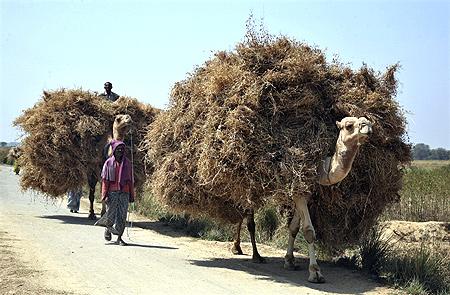
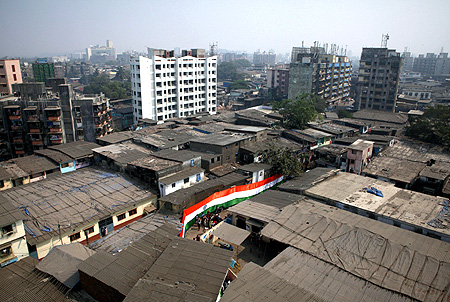
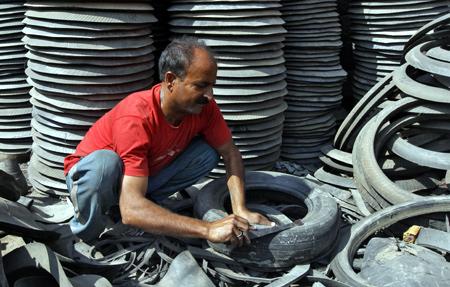
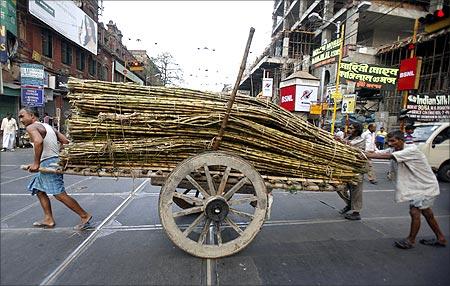
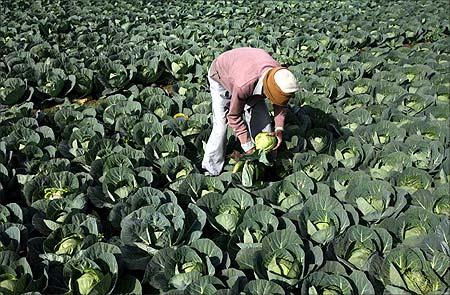

article